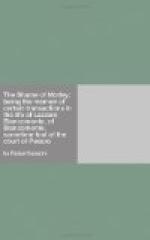“True, but the thought is one that affords me more comfort and joy than pride. As much comfort and joy as you shall take horror when I tell you in what manner I have fooled you.” I paused to heighten the sensation of my words.
“To such good purpose have I used my wits that ere another sun shall rise and set you will have followed me along the black road that I am now treading—the road whose bourne is the gallows. Bethink you of the charred paper that last night you brushed from this table when you awoke to find a candle fallen on the treacherous letter Vitellozzo Vitelli sent you in the lining of a hat.”
His jaw fell, his face flamed redder than ever for a second, then it went grey as ashes.
“Of what do you prate, fool?” he questioned huskily, seeking to bluster it before the startled glances of his officers.
“I speak,” said I, “of that charred paper. It was I who laid the candle across it; but it was a virgin sheet I burned. Vitelli’s letter I had first abstracted.”
“You lie!” he almost screamed.
“To prove that I do not, I will tell you what it contained. It held proof that bribed by the Tyrant of Citta di Castello you had undertaken to pose an arbalister to slay the Duke on the occasion of his coming visit to Cesena.”
He glared at me a moment in furious amazement. Then he turned to his officers.
“Do not heed him,” he bade them. “The dog lies to sow doubts in your minds ere he goes out to hang. It is a puerile revenge.”
I laughed with amused confidence. There was one among them had heard Lampugnani’s words touching the messenger’s hat—words that had cost the fellow his life. But my concern was little with the effect my words might produce upon his followers.
“By to-morrow you will know whether I have lied or not. Nay, before then shall you know it, for by midnight Cesare Borgia should be at Cesena. Vitellozzo Vitelli’s letter is in his hands by now.”
At that Ramiro burst into a laugh. So convinced was he of the impossibility of my having got the letter to the Duke, even if what I had said of its abstraction were true, that he gathered assurance from what seemed to him so monstrous an exaggeration.
“By your own words are you confounded,” said he. “Out of your own mouth have you proven your lies. Assuming that all you say were true, how could you, who since last night have been a prisoner, have got a messenger to bear anything from you to Cesare Borgia?”
I looked at him with a contemptuous amusement that daunted him.
“Where is Mariani?” I asked quietly. “Where is the father of the lad you so brutally and wantonly slew yesternight? Seek him throughout Cesena, and when you find him not, perhaps you will realise that one who had seen his own son suffer such an outrageous and cruel death at your brigand’s hands would be a willing and ready instrument in an act that should avenge him.”




